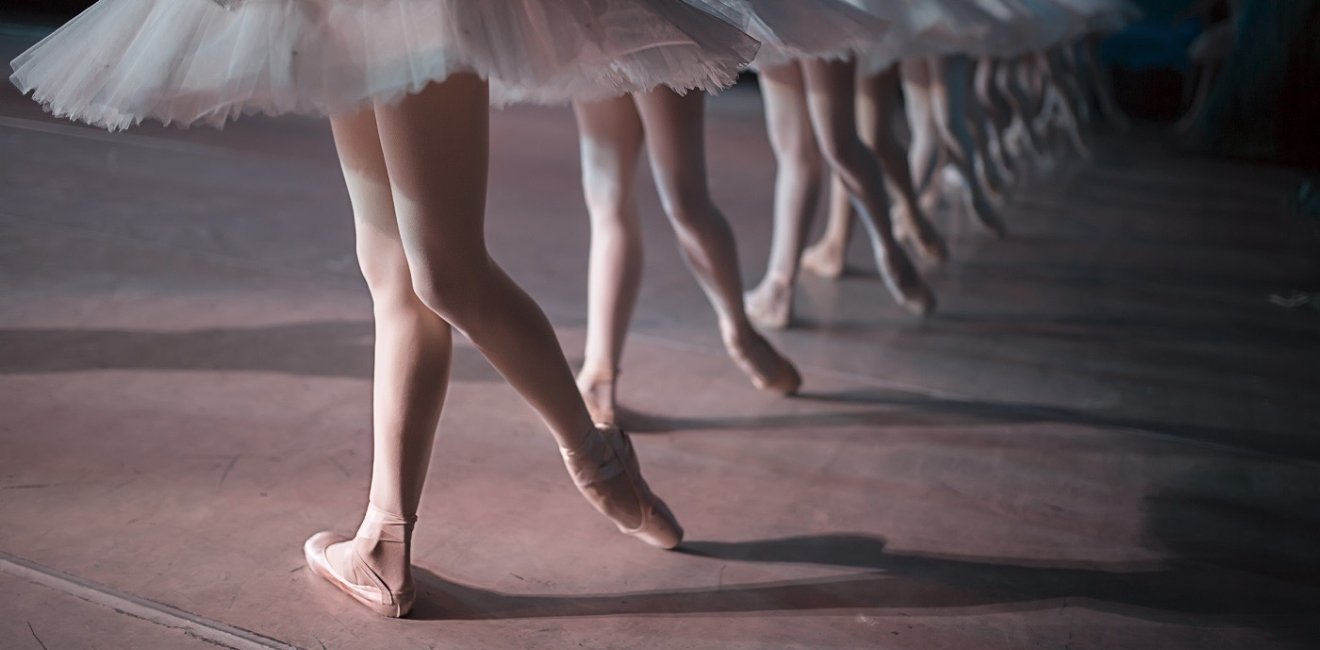
A blog of the Kennan Institute
On November 1, 2023, the Russian feminist protest collective Pussy Riot released Swan Lake, a musical video, accompanied by a call to return “all kidnapped Ukrainian children,” desist in “poisoning children with Putin’s propaganda,” and sanction “Russian propagandists and Russian artists that serve this fascist propaganda.”
Pussy Riot members Maria Alyokhina, Olga Borisova, Diana Burkot, and Lucy Shtein collaborated with French-based director Anna Aristarkhova, Siberian artist Alisa Gorshenina, Icelandic musician Kjartan Sveinsson of Sigur Rós, and a Lithuanian production crew headed by director of photography Nikita Voitov to craft an apocalyptic fairytale-meets-musical manifesto.
The artistic cues of Swan Lake juxtapose the cultural mythologies of the Russian imperial past with the violence, corruption, and political persecution of Putin-era Russia. In a central sequence of the video, Pussy Riot cofounder Alyokhina delineates the myriad phrases with which “Russian state media poisons people’s hearts and brains with hatred.” Alyokhina’s diatribe in her guise of a TV presenter reveals the dangerous deception of Putin’s propaganda in justifying war on Ukraine as “denazification.”
Cultural Cues and the Background to Regime Change
Pussy Riot’s denunciation becomes especially powerful when viewed through the historical prism of Russian culture. Most explicitly, the video takes its title and framing musical motif from Pyotr Tchaikovsky’s ballet score, Swan Lake. The ballet that is now synonymous with Russian art was set in medieval Germany and was deemed too Wagnerian following its 1877 premiere in Moscow.
Tchaikovsky in fact attended the 1876 opening of Richard Wagner’s Ring of the Nibelung at Bayreuth, the festival funded by the composer’s patron, Ludwig II, and subsequently championed by Adolph Hitler himself. The name of Tchaikovsky’s balletic prince, Siegfried, suggests the title character from the third music drama of Wagner’s Ring cycle, and his depiction of a ruler reluctant to marry recalls the confirmed bachelor Ludwig II, also known as the Swan King.
The tribute to German romanticism in Tchaikovsky’s ballet acquired explicitly antisemitic intonations in the 1895 revival, staged in St. Petersburg during a period of pogroms and anti-Jewish policies. The version of the ballet that we recognize today debuted two years after the composer’s death and featured new choreography by Marius Petipa and Lev Ivanov, new music by Riccardo Drigo, and a new libretto by Modest Tchaikovsky, the composer’s brother.
In part to streamline the ballet and in part to obscure rumors circulating regarding Tchaikovsky’s death and sexuality, his brother changed the villain of Swan Lake from a jealous stepmother to a lecherous genie, Baron Von Rothbart. In the 1895 production, Von Rothbart was represented with a red beard and horns, characteristic tropes of the antisemitic performing idiom.
The swan harem under Von Rothbart’s spell enchanted rulers from Alexander III to Nikita Khrushchev, who saw Swan Lake so many times that he told the ballerina Maya Plisetskaya he dreamed of “white tutus and tanks.”
Over the course of the twentieth century, the ballet Swan Lake became a marker of regime change. Soviet television broadcast Swan Lake following the deaths of leaders Leonid Brezhnev in 1982, Yuri Andropov in 1984, and Konstantin Chernenko in 1985. The ballet score played repeatedly during the August 1991 attempted coup that precipitated the collapse of the Soviet Union.
A Modern-Day Symbol of Dissidence
While the Soviet state utilized the ballet as a testament to the enduring power of Russian art during times of conflict, activists in Putin’s era have appropriated the iconic work as a symbol of dissidence.
Tchaikovsky’s four little swans have appeared as graffiti art since Putin’s 2018 inauguration. The same pas de quatre from Swan Lake concluded the final broadcast of Moscow’s last independent television station, TV Rain, following its 2022 protest against the war in Ukraine. And now Pussy Riot has donned swan-inspired balaclavas and provided a platform for the plight of abducted Ukrainian children and all children imperiled by Putin’s propaganda.
The opening sequence of Pussy Riot’s alternative Swan Lake presents a video-game version of Tchaikovsky’s swan motif in B minor. In addition to the musical prompts, visual clues engage Russia’s imperial heritage and reinforce the antiauthoritarian angle of the work.
The camera then zooms in on an A-frame hung with blood-red curtains. This modern rendering of the witch Baba Yaga’s hut houses a young boy, Misha Shevchenko (son of the activist Anastasia Shevchenko), seated before a television. As he enacts with toy soldiers the real war beyond the hut, a trio of masked women (Alyohkina, Borisova, and Burkot) intone the message of the state: “The value of life is overestimated / women should give birth more / don’t pity the soldiers / women will birth more.” The boy looks down again to find his hands covered in blood.
The sun masks worn by the unholy trinity are the work of Urals-based artist Gorshenina and reference the traditions of mumming and Maslenitsa in Russian folk culture.
Two huge and disembodied hands by Gorshenina creep out of the window before the camera cuts to Alyokhina’s televised recitation of Russian justification for the war. The camera zooms in on Alyokhina as the refrain builds and the magnification produces vertical lines across her face. A cutaway shot reveals a red-lit Burkot, who removes her mask and declares, “We won’t forgive you / and we’ll trample the remains / Ostankino tower will burn beautifully,” an allusion to Moscow’s television tower.
The video was filmed this past spring outside Vilnius, and the stand of birch trees in the background conjures the 1889 painting Birch Grove by Isaac Levitan. Although the Lithuanian-born “mood landscape” painter and friend of Anton Chekhov repeatedly faced eviction from Moscow for his Jewish heritage, the 2010 exhibition at the Tretyakov Gallery called his work “the highest point in the development of Russian landscape art of the 19th century.”
The next shot is static. The Levitanesque landscape of a sheep meadow is rendered doubly haunting by the “black christened bag” of “a Russian groom” carried toward the camera and the synthesized bells tolling Tchaikovsky. In a subsequent tracking shot, the boy frantically flees the hut to the accompaniment of Pussy Riot’s litany of wartime suffering: torture, imprisonment, and death.
Racing through the pine trees, the child hero of Swan Lake encounters a black swan (played by Shtein) wielding a Kalashnikov, the ominous masked trio moving mechanically, and the sculptural head of a soldier rolling on the forest floor. The camera zooms in on the grotesquely exaggerated prop hands grasping a tree trunk before tracking the boy’s hands as he buries the state-sanctioned message at an “altar,” as described by director Aristarkhova, beneath a knotty pine. Clad in pink balaclavas, Pussy Riot raps the climactic lines: “War is a holiday and everything is fine.”
The holiday that concludes Swan Lake resurrects Tchaikovsky’s swan motif, repeated four times in a brassy Soviet-era rendition. A drone-mounted camera circles a group of six masked women revolving around a burning effigy in the tradition of Walpurgis night. The three unmasked members in flowing white gowns whisper the chorus—“We won’t forgive you / and we’ll trample the remains / Ostankino tower will burn beautifully”—as if casting a spell.
In keeping with their commitment to the real-life impact of protest art, Pussy Riot has pledged proceeds from its Riot Days show, a blend of music, theater, and “political happening,” to aid the Okhmatdyt children’s hospital in Kyiv. As part of its North American tour, the play makes its Washington debut at the 9:30 Club on December 2, 2023.
The opinions expressed in this article are those solely of the author and do not reflect the views of the Kennan Institute
Author

Scholar In Residence, The Washington Ballet

Kennan Institute
After more than 50 years as a vital part of the Wilson Center legacy, the Kennan Institute has become an independent think tank. You can find the current website for the Kennan Institute at kennaninstitute.org. Please look for future announcements about partnership activities between the Wilson Center and the Kennan Institute at Wilson Center Press Room. The Kennan Institute is the premier US center for advanced research on Eurasia and the oldest and largest regional program at the Woodrow Wilson International Center for Scholars. The Kennan Institute is committed to improving American understanding of Russia, Ukraine, Central Asia, the South Caucasus, and the surrounding region through research and exchange. Read more

Explore More in The Russia File
Browse The Russia File
Chechnya as a Model of Modern Russia

Russia’s Indigenous Communities and the War in Ukraine

Gas and Power in a Changing US–Russia Relationship

